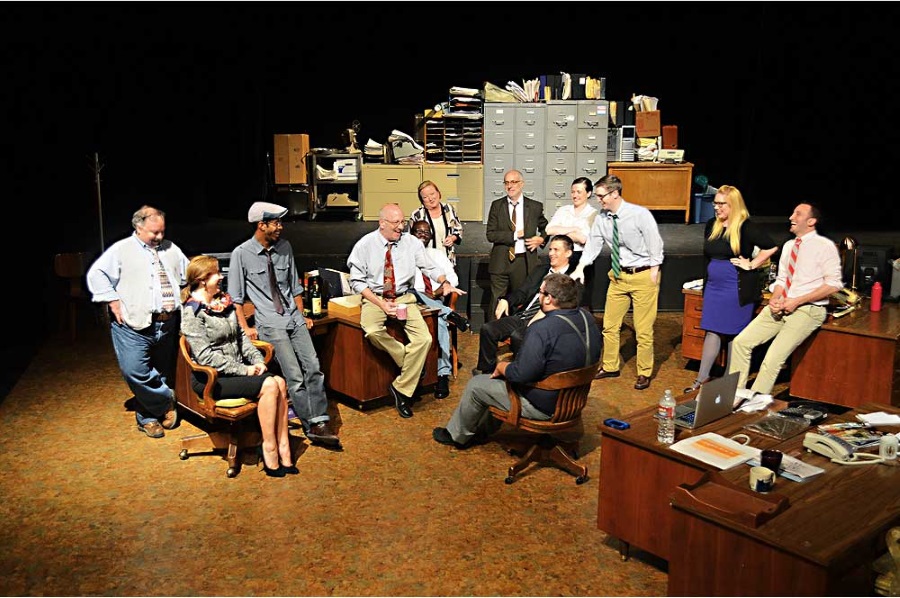Sane politics and environmental responsibility have always been hard-to-come-by commodities in Louisiana—and for nearly a decade now that twin deficit has been wreaking unprecedented havoc on the Bayou State. The troubles have fallen most grievously on the state’s culturally distinctive, geographically unique and artistically tough-minded southern half.
Anchored by a recuperating metropolis more dependent than ever on image-bolstered tourism, South Louisiana has put on a brave front in the face of post-Katrina adversity. But, surprisingly, the public conversation generated by multiple crises hasn’t shallowed out into promotional, we’re-okay-now blather. That’s true in no small part because of an ongoing array of artistic and performative responses from an energized, socially committed local arts community that has willingly seized the issues at hand as creative fodder—and that seems to understand the state’s pressing problems (particularly from a human perspective) better than most of its elected officials.
Stories from the annals of Katrina—the hurricane hit in 2005, killing hundreds, displacing thousands and doing immense damage to the ecologically essential wetlands south and west of New Orleans—have proliferated on New Orleans stages (including Southern Rep, where Mold, the final work in a trilogy of Katrina plays by Loyola professor John Biguenet, ran this past summer) to the point of overstaying their welcome, and have in a few cases (The Breach, by Tarell Alvin McCraney, Catherine Filloux and Joe Sutton) been seen around the country. But Louisiana’s internecine troubles are about to generate more theatrical buzz, on the home front and beyond.

You remember the headlines: Less than five years into the Katrina recovery, BP’s world-record oil spill off the Louisiana coast exacerbated the wetlands crisis and turned a swath of the seafood-rich Gulf of Mexico into a dead zone. Then, in 2012, the newspaper that had won two Pulitzer Prizes for its against-all-odds coverage of Katrina, the 175-year-old Times-Picayune, ceased daily publication, granting New Orleans the dubious distinction of becoming the largest U.S. city without a daily newspaper. These developments, both profoundly unsettling to Louisianians, have captured the attention of several theatre artists, homegrown and otherwise.
The BP disaster will be examined from multiple angles in a new documentary-style play, Spill, by Leigh Fondakowski, a veteran member of Tectonic Theater Project. Slated to open in March 2014 at Swine Palace Productions in Baton Rouge, 70 miles up the Mississippi River from New Orleans, then to tour the state, Spill incorporates material from more than 100 interviews with citizens impacted by the event. “It captures the voices of the people in bayou country, and its political and social scope are truly epic,” says Fondakowski’s longtime colleague, Tectonic artistic director Moisés Kaufman, who goes on to describe her play as “in the vein of Winesburg, Ohio and Spoon River Anthology. I find it theatrically thrilling.” Spill will not be a Tectonic production, but will debut under the auspices of Fondakowski’s newly formed Study Group and Octopus Theatricals, the fledgling company launched this year by Mara Isaacs.
Louisiana audiences have already encountered two other major new works that examine the state’s misfortunes via wildly differing formats.
The experimental ensembles ArtSpot Productions and Mondo Bizarro, frequent collaborators on the New Orleans scene, have again joined forces for Cry You One, a “site-responsive” performance about the loss of coastal lands and residents, which takes the form of an outdoor processional on a stretch of land in Lower St. Bernard Parish that is rapidly disappearing. Running through Nov. 24 (when it coincides with the seventh edition of the New Orleans Fringe Festival, Cry You One is directed by ArtSpot’s Kathy Randels and features among its cast of 10 Mondo Bizarro’s Nick Slie (who played a feral swamp beast to indelible effect in the troupes’ 2009 co-production Loup Garou).

Another ensemble A.D., the NOLA Project’s A.J. Allegra, played the double roles of producer and a vivid leading character in Jim Fitzmorris’s high-impact drama A Truckload of Ink, based on the dismantling of the Times-Picayune, which debuted in September at the University of New Orleans under Beau Bratcher’s well-paced direction. Despite its specificity, the play, according to Allegra, has generated interest in other parts of the country where newspapers are being scaled back by their corporate owners. Set in the paper’s cluttered city room on the day news of the deal came down, Ink “captures the moment when the Internet age caught up to the printed media age and slipped a knife in its side,” as Allegra puts it.
The actor/director’s egotistical city-desk Lothario was one of the play’s 14 convincingly drawn characters, many of whom suggest real-life counterparts that audiences and critics have delighted in identifying. One cast member, Martin Covert, who offered an authoritative performance as the paper’s compromising editor-in-chief, was himself a longtime T-P employee until he was abruptly laid off, along with half the paper’s newsroom staff, when the axe fell in April 2012. (Full disclosure: This reporter started his journalistic career on the city desk of the Picayune’s now-defunct afternoon daily The States-Item, working alongside some of the veteran journalists alluded to in Fitzmorris’s script.)
Ink’s 45-year-old playwright is a New Orleanian par excellence, who can trace his ancestry in the region back to 1847 (at which point, incidentally, the Times-Picayune had already been publishing for a decade). “I’m interested in having a conversation with the people of New Orleans about their city,” Fitzmorris says with a certain ingenuousness, as he has authored some 20 plays, almost all of them about N.O.-related issues, local history or, in his words, “the rough-and-tumble daily life” of the city. A one-time university professor who holds a Ph.D. in theatre history and criticism, Fitzmorris currently works as a quality control checker for a solar panel installation firm, a job that puts him in touch with an eclectic mix of residents in every quarter of the city, and gives him ample opportunity to listen to and record their stories—in preparation, one suspects, for the next 20 plays.
As voluble as he is prolific, Fitzmorris offers unabashed admiration for the formal adventurousness of troupes like ArtSpot and Mondo Bizarro, but he’s confident that his own gifts involve the kind of dramaturgy in which “you see the story happen as you tell it.” A Truckload of Ink, he says, is his “big, sprawling piece of American realism.” As such, it may also be his breakout play, the one that brings his affectionate and deeply informed vision of life in New Orleans—and the human intricacies of the region’s cataclysmic recent history—into the national consciousness.


